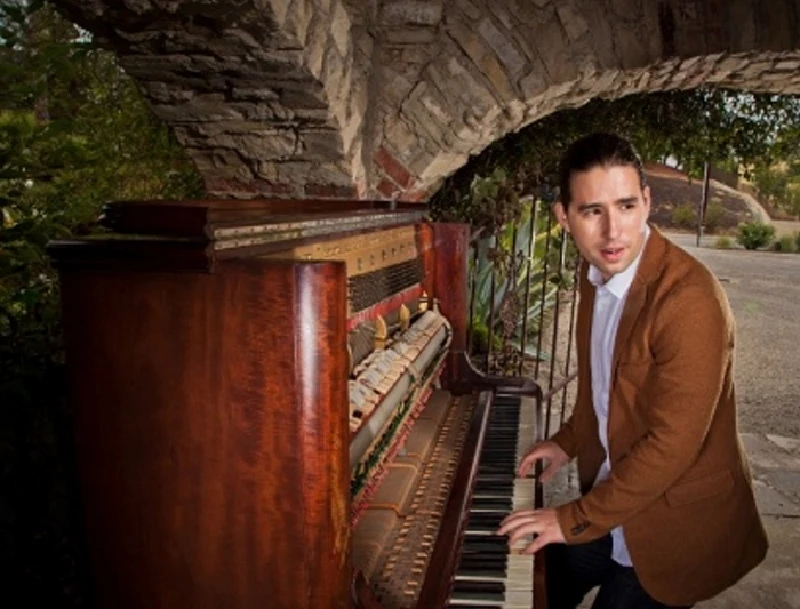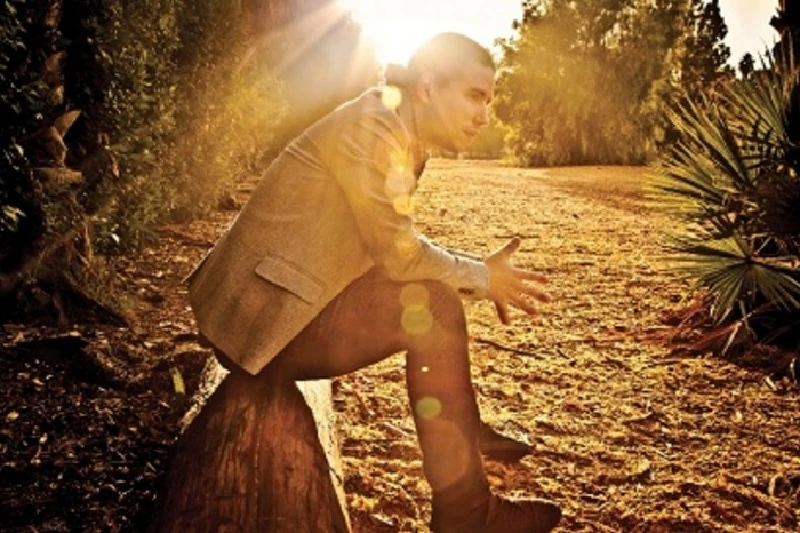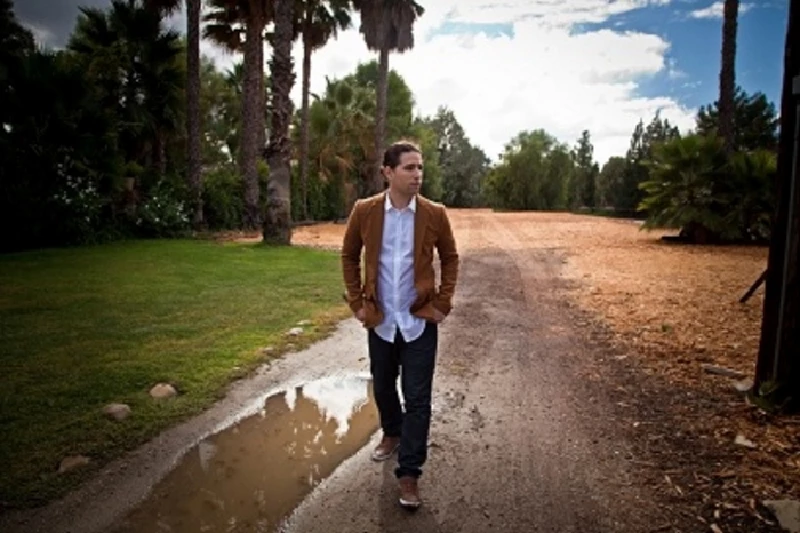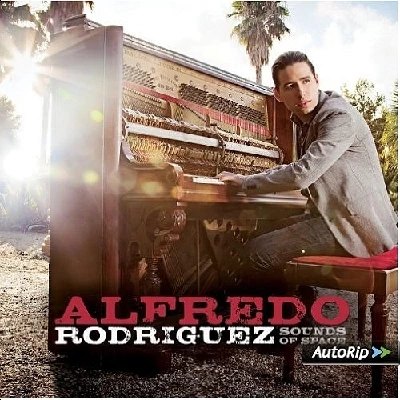Alfredo Rodriguez - Interview
by Lisa Torem
published: 13 / 3 / 2012

intro
Cuban jazz pianist and composer Alfredo Rodriguez talks to Lisa troem about his album, 'Sounds of Space', which was co-produced by Quincy Jones
At fifteen Alfredo Rodriguez fell in love with Keith Jarrett’s ‘The Koln Concerto’. Although classically trained, he became enchanted by this unique style of improvisation. Little did he know he would face another turning point that would affect his career. Fast forward. The Cuban pianist/composer performed at the Montreaux Festival in Switzerland. Claude Nobs, the producer, suggested he play again for Quincy Jones. After a Cole Porter arrangement, Jones was smitten. He invited Rodriguez to work on his first serious recording, ‘Sounds of Space’. This debut would include the talents of Bulgarian-born bassist Peter Slavov and Francisco Mela, a Cuban drummer. In 2009, while performing with his father, Alfredo Rodriguez Sr., in Mexico, he would experience another life-altering journey, but not without conflict. Working with Jones would mean leaving behind everything he knew and loved in his native Havana; and abandoning his final year of university. Still Rodriguez, one of only twelve pianists chosen to play at Montreaux, now had the opportunity to actualize his musical future in California ‘Sounds of Space’ sweeps the listener away with inventive interpretations, based on bebop, romantic/classical compositions and rhythms rooted in Cuban traditions, but it took a few miracles to get there. Alfredo Rodriguez explains his journey in more colourful detail… PB: You’ve been influenced by a diverse set of artists. Which compositions especially attracted you, and are there others? AR: Inspiration is everything in the type of music that we do. Improvisation is the main focus. It’s like a language, and in order to respect that language we have to risk ourselves or centre ourselves, and, when we go to the performance, we have to be sincere and express whatever is coming into our mind. The difference between classical and jazz music is that when you’re playing classical music you’re playing music that was written maybe one hundred years ago, and, when you are performing that music, everybody plays it differently, but you have to respect the patterns and play that music in a kind of way that respects the composer a lot. But when you play jazz or improvisational music, or whatever people want to call it (Laughs), you are composing at the same time. So my inspiration is coming from everything, because what I really like to do is go onstage and play whatever is coming into my mind. So what I’m feeling at the moment? That could be love, that could be destruction, that could be a lot of problems that we have in our life, or a lot of happiness. That is my main inspiration, but speaking of composers, Ernesto Lecouna, is one of the composers that has really thrilled me. In Cuba he’s really a popular and classical composer at the same time. One of his pieces is ‘Danzas AfroCubanos’, six pieces that he composed, inspired by African music. He did really beautiful work on that. From Bud Powell, I really like ‘Oblivion.’ I like all of his music, but if I have to mention something I would mention ‘Tempus Fugit’. For Thelonious, I would say, ‘Ask Me Now’ or ‘Of Minor’. I love all of his compositions, ‘Epistrophy’, ‘Around Midnight’. I love all of them. PB: But you studied classical music first. AR: Yes, I started when I was ten years old in the classical conservatory of music in Havana, called Manuel Saumell -- one of the two or three conservatories there. He’s another one of the greatest traditional composers of the 19th century. We should start at the beginning. A lot of people start today, but I really think we have to study all the aspects of life, not just music. We have to go really deep and go to the roots in order to understand who we are and where we want to go at this moment. We have to know why we do this in the 21st century. Bud Powell and Thelonious Monk created the bebop era. They really created something. You can say that we are creative, but at the same time, I think, I am still growing and studying very hard and trying to find myself. So going back, I studied classical music and I decided to come here to the US. Last year I finished at the university in Havana. I still play classical music every day. PB: Which classical composers influenced you? AR: I would say Bach. PB: I can hear a lot of Bach in your compositions. AR: I think his music is something else. He had a different point of view than anybody else had. I really love classical contemporary music. I really love Stravinsky, Prokofiev, Ravel and Debussy. But I really like Beethoven, Brahms and Mozart as well. PB: Originally you were attracted to percussive instruments. AR: When my parents first brought me to the school, I was six and I had to choose between piano and violin. I chose piano with the idea of changing to percussion when I was ten, but then I started really falling in love with the piano and I didn’t want to change anymore, so I stayed. But I never got to study percussion. I got to study a lot of rhythms, a lot of different patterns and theories, but that was just from going to school by myself. PB: How often is piano used in traditional Cuban music? Has it been often used or only for special celebrations? AR: It depends on what kind of music you’re playing. For example, if you’re playing rumba, (or another dance style) with different rhythms, we don’t use any instrument that is not percussion or voice. But, of course, there are a lot of people who use rhythms and compose for piano. These rhythms came from Africa, as we know, but they didn’t have pianos. They played just with the drums. So in those styles, they didn’t use piano at that time. Speaking of the cha cha, or danzon, or boleros, for styles of music that use those rhythms, yes, we used piano. It is a very important instrument in Cuban music and I think it is one of the strongest instruments that people have developed in Cuba. In the jazz and classical world, too, piano is one of the strongest instruments in Cuba. PB: Your father had his own show. AR: Yes. I started playing with my dad because he was a Cuban singer. I started playing in his band at fourteen years old. I was honoured to be part of that. He invited all of the greatest Cuban musicians and I had the opportunity to arrange for them, sometimes, just to play. On the last (programme) he did, I arranged everything for the musicians. Some of them were not famous internationally, but they were really good musicians. I had that opportunity when I was about 18, so that was a great school for me, and before that I did a programme for him. I was not the musical director. I was the pianist with composers from the 50’s era, the 60’s era and I learned a lot from them, too. I was playing different music every day and reading a lot. My improvisation is different, but when you have to read every day that is the greatest school for a kid who is like fifteen or sixteen, because a lot of us are not accustomed to this professional work. You have to be really prepared. My grandparents were really poor, so my father grew up in a really difficult situation and he couldn’t make it to the school of music, so he just started singing in the streets of Cuba. For some reason, he got very famous. People liked what he did and he appears to be one of the most famous singers coming from Cuba. He’s not famous internationally, but in Cuba he’s really famous. PB: A complex piece, ‘Crossing the Border’, was based on a real life experience. How did you translate this into music? AR: My music sometimes sounds weird, but I don’t think it’s coming from music. It’s coming from experiences. It’s coming from feelings. I study my music about eight hours every day: studying patterns, a lot of different composers, transcriptions from music that I really like, but when I am playing and composing sometimes I’m not really thinking. In improvisation, we cannot prepare, because if we prepare everything it’s not going to be improvising. We’re going to be lying to ourselves and everybody knows it. You are lying to them and they will know that you are lying to them. We have to be organized and we have to have a lot of discipline at the same time. It’s really hard, but it’s really what I think we have to do for improvisation. But, of course, you have to study a lot before you can do that. PB: In ‘Crossing the Border’ it sounds like you are creating a dialogue. You play passages way up on the high notes and then mimic them on the low notes many times. Is that right? AR: Yeah. What I really wanted to express with that song was my stress. A lot of people are focusing on these kinds of words, but I think every word has a very important meaning in our language, so why not go and look at these feelings? Spiritually I am really close with my family. I was leaving them physically at that time and I was doing something that was kind of crazy; crossing the border from Mexico to the US. As you know, the border is very dangerous and actually, I was arrested and they asked me a lot of questions. They are kind of corrupt over there, so they wanted money. I didn’t have any money at the time, so I couldn’t give them any. Thank God. I told them the truth. I told them, “Look, I want to cross the border. I want to go there because of all of this music”, and thank God that they spoke Spanish because at that time I couldn’t speak English, and speaking English is very uncomfortable for me. With you too, I am still learning the language. But in Spanish, it’s so easy for me. In order to make them listen to my story, after four hours, they understood and they let me go. So I crossed the border that day. It was difficult stuff. The first week that I came to the US, I wrote that song. PB; It’s a brilliant tune and it really captured that tension. AR: Thank you. It’s good that people get the message, because sometimes artists try to get this message so hard, but sometimes people don’t get it, and, for me, if you can get that message from the music, then I’m very happy. It’s not like saying lyrics where people can repeat it. PB: That’s the challenge with instrumental music. AR: And to connect with the people is very interesting. It’s not just about notes. It’s not about harmony. PB: In Havana music is truly everywhere, being performed by young and older people. I heard more music there than I’ve ever heard in the US. AR: I think that Cuban people are really into the music. You can see it in the streets. Sometimes you can see the way that they walk that they are kind of dancing. That is interesting to me. There is a lot of that in Brazil and in Africa. We are coming from that. PB: Are young people generally exposed to music at home? AR: That’s a difficult question. I think it’s kind of in their blood. I think it’s something common to us, the African influence. It’s different, of course, than in the United. States. But you can go to places like New Orleans and you can feel that too sometimes. When you go there, you feel like there is happiness and there is love for what they do. I’m not trying to say that when you are in your house studying that you are not feeling it. I know a lot of musicians in the US that make beautiful music, but, in general, when people are walking down the street in Cuba, or New Orleans, or Africa, I think it’s in the blood, I don’t know why, but we are like one of those countries, where you just feel it, and we are very fortunate that we are like that. It’s very interesting how a little kid can play the drums without going to school, without knowing exactly what he is doing, just by feeling, and that’s happening a lot in Cuba. Sometimes they are so much better than the people who study in the school, but at the same time they have not been to the music school. It’s a beautiful thing that we have in Cuba. I admire that because people love to dance. People love music. PB: How was working with Quincy Jones? AR: As you can imagine, working with Quincy is very interesting. The main thing that I love about being with Quincy is that I’m always learning a lot about different things. He knows a lot about jazz music, classical music and pop music, about what is happening in the world right now, with the music business. He has all these stories, and he has incorporated a lot of those stories and that knowledge to me. And since the first time that that we worked together, he has been really open to me. Because sometimes people ask me, “Does Quincy tell you that you have to do this or you have to do that?” And I always say the same. No, Quincy, with me, (and I think he’s like this with everybody), I know his personality a little right now, and I see him acting the same way with everyone, and he’s open and free. He just tells you to go for it and do what you really feel, and that it is going to be very important in your life to follow whatever you are feeling. Don’t change your mind because, as we know in the music business, unfortunately, what has happened now is people just think about making money and this is not a “making money” career. We have to love what we do and if you don’t love it you can’t make music. I think everybody comes to this world with something special to do. You can be sure about that. If you don’t want to sacrifice a little bit and fight for whatever you choose to do, I don’t know if that makes sense…so he always said, you should do whatever you want to do and I really respect that. PB: Some songs like ‘April’ were solos and some were played as a quartet. AR: I play my music every time differently when I perform it and, while it’s easy for me to decide when I go to the studio, what I like most is when I play live. I’ve been playing those songs for a long time, with a trio, with a quartet, or as a solo, and it’s like there is some light that is coming into my mind and telling me you should do this solo. It’s working better for you. You should do this with a trio and you should do this with a quartet. But it’s very easy because the people I play with are very open and we have the same point of view. At the end, it’s just a matter of what I like most and the first time that we recorded, I knew I wanted to introduce myself as a piano soloist, because I had been doing a lot of piano solo concerts. PB: Now ‘Crossing The Border’ is a completely different type of arrangement than the more serene ‘April.’ Were you in a different mood each time you composed? AR: Completely different. It’s different when I play. Every time it’s different feelings. PB: Did you grow up listening to classic Cuban standards? AR: Yes, of course. I usually play Cuban songs in my concerts too. I usually play ‘Viente Anos’ (Maria Theresa Vera). I usually play ‘Guantanamera’ (Jose Fernandez) or ‘Quisas, Quisas, Quisas’ (Oswaldo Farres). I love Cuban songs and I think they are beautiful. For me, it’s very interesting to make it in my own way. PB; Now that you are performing so much, do you still practice? AR: It depends on what I have to do that day, but in some part of my mind I’m always practicing with the piano for hours a day. But if you are asking me just about myself, I practice sometimes the whole day, because I am thinking all the time of possibilities and thinking all the time of making music. Sometimes I think that is better practicing than being at the piano. What music really is is thinking. PB: So you’re thinking all of the time, even when not playing. AR: Definitely. Thinking all of the time about possibilities and ways to make music. Right now I am looking out of my window in Los Angeles. The cars have rhythms. They are doing some rhythm right now. Those rhythms are really interesting right now. They are not 4/4. They are going in and out, right there. For me, that is rhythm, so I am learning from those cars a lot of rhythms. They are going slow. They are going fast. It’s like a top. If you are not open to that, you cannot go more and more. If you are open to that, you are trying to find sounds. You are trying to find rhythms and movement and you are trying to make music. That is really what I want, something that can be infinite for me. I’m learning every day and that is the most important thing for me. PB: What are your future plans? AR: I am making new music. I’m composing my first big piece for a symphony orchestra. It is taking a lot of my time, but I am learning a lot about symphonies, and about compositions. I am going in the classical/contemporary world, but at the same time with this sense of improvisation. I’m touring internationally. I’m leaving today for Indonesia. I’m going to play with my trio at the Java Jazz Festival in Indonesia, and this month I will also be in South Africa for the Cape Town Jazz Festival. Then I will be in Boca Raton, Florida, for a festival over there with my trio. We have shows coming up in Los Angeles and the Playboy Jazz Festival therewith a quartet. With the trio, I will do six concerts in the US. We will go to New York too. PB: Thank you.
Band Links:-
http://www.alfredomusic.com/https://twitter.com/alfredomusic
https://www.facebook.com/alfredorodriguezmusic
https://www.youtube.com/user/alfredorsmusic
https://plus.google.com/104851129589801359074
https://www.instagram.com/alfredormusic/
Picture Gallery:-


soundcloud
reviews |
|
Sounds of Space (2012) |

|
| Astonishing combination of classical, be bop and Latin music on debut album from Cuban pianist, Alfredo Rodriguez |
most viewed articles
current edition
Carl Ewens - David Bowie 1964 to 1982 On Track: Every Album, Every SongArmory Show - Interview with Richard Jobson
John McKay - Interview
Colin Blunstone - Thalia Hall, Chicago, 16/7/2025
Billie Eilish - O2 Arena, London, 10/7/2025
Bathers - Photoscapes 1
Visor Fest - Valencia, Spain, 26/9/2025...27/9/2025
Loft - Interview
Sir Tim Rice - Interview
Robert Forster - Interview
previous editions
Manic Street Preachers - (Gig of a Lifetime) Millennium Stadium, Cardiff, December 1999Heavenly - P.U.N.K. Girl EP
Beautiful South - Ten Songs That Made Me Love...
Oasis - Oasis, Earl's Court, London, 1995
Peter Perrett - In Dreams Begin Responsibilities Interview Part One
Prolapse - Interview
Coldplay - Wembley Arena. London, 16/8/2022
Boomtown Rats - Ten Songs That Made Me Love....
Trudie Myerscough-Harris - Interview
Pixies - Ten Songs That Made Me Love...
most viewed reviews
current edition
Davey Woodward - Mumbo in the JumboSick Man of Europe - The Sick Man of Europe
Lucy Spraggan - Other Sides of the Moon
Phew, Erika Kobayashi,, Dieter Moebius - Radium Girls
Amy Macdonald - Is This What You've Been Waiting For?
Bush - I Beat Loneliness
Suzanne Vega - Flying With Angels
Alice Cooper - The Revenge of Alice Cooper
Blueboy - 2
Cynthia Erivo - I Forgive You
Pennyblackmusic Regular Contributors
Adrian Janes
Amanda J. Window
Andrew Twambley
Anthony Dhanendran
Benjamin Howarth
Cila Warncke
Daniel Cressey
Darren Aston
Dastardly
Dave Goodwin
Denzil Watson
Dominic B. Simpson
Eoghan Lyng
Fiona Hutchings
Harry Sherriff
Helen Tipping
Jamie Rowland
John Clarkson
Julie Cruickshank
Kimberly Bright
Lisa Torem
Maarten Schiethart